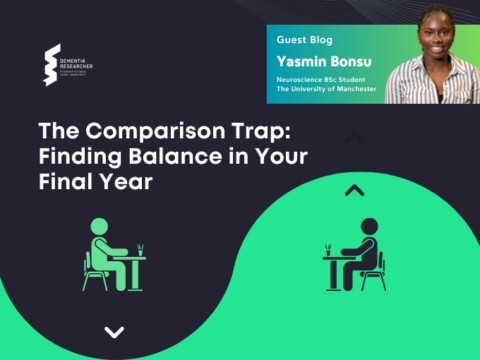In some ways this is a strange one for me. Ever since I transitioned away from wet lab work into computer lab-based data science, working from home (WFH) has always been a part of academic life. When all you need is a laptop and a dataset the world is your hot desk.
Thinking back to my PhD and Postdoc work before covid I would say there were few weeks where I worked 100% from my desk in my office, and this was usual for most people around me. When I began my PhD My supervisor was also only at Newcastle part time, she spent most of her week in Cambridge so Skype meetings were very normal from the start.
Flexibility has always been prominent in research culture, I often find myself wondering, why does it feel so different now? The facts are that since the pandemic many in my field of research are working from far more than the past, indeed there are more empty desks on the average workday than occupied ones. In this blog I want to explore this shift. Is it universal or are only certain disciplines affected, is it a good or bad thing? Overall, how is it affecting the culture of working in research?
The Good
Firstly, from a purely free market perspective people enjoy the flexibility of working from home. If people did not enjoy it then there would surely be a lot less people taking up the opportunity. When thinking about WFH I often come at it with my Equality, Diversity and Inclusion leader hat on. The flexibility provided by working from home is often very beneficial for colleagues with protected characteristics. In many places workspaces are less than ideal for people with a range of disabilities. It can make planning work around caring responsibilities much easier, as well as giving parents more flexibility around childcare provision, which again is a burden most likely to fall on women researchers.
There are also financial considerations, several of which overlap with the earlier points. At this point in time the cost of living is a big pressure on many of us. The opportunity to save the money you would normally spend on that train, bus or petrol for commuting is an attractive one. Additionally, many university campuses are located in city centre’s where the cost of living is most acute. Money is not the only thing that can be saved, many would argue that WFH is more time efficient. It is safe to assume many researchers spend around 2 hours travelling to and from work, it’s fair to say that is 2 hours which could be spent getting straight to work.
As well as the preference of the individual there are also wider considerations to more WFH. One is the environment; most research institutions are trying to cut down on their carbon footprint. Less people travelling into work, again often into universities in busy city centres, means less impact on the environment. In my experience there have always been issues in universities around overcrowding in labs and office space, naturally there are many who can benefit from workspaces becoming less crowded. The PhD student or postdoc who has a hot desk could get some permanent space of their own.
Being more welcoming to WFH can also benefit institutions when it comes to hiring. One of the ongoing issues for a career in research is instability. If employers did not expect you to move across the country to work on a relatively short-term contract, researchers could get a more diverse experience of research without having to uproot your home life. It also makes it easier to attract more prestigious researchers to institutions, particularly those in more remote or historically deindustrialised areas. For example, researchers who have built a career around the so-called ‘golden triangle’ of Oxford, Cambridge and London are more willing to take positions in the north of England, Scotland or Wales if it does not require a huge change of lifestyle. This could help rebalance expertise around the country giving a boost to institutions far from London.
On a smaller scale, as researchers we are notorious for having our own little rituals and way of doing things, and no two people are the same. In my field of biostatistics this means WFH means I can have my office set up the way I like, I can use my own preferred hardware and software. When I work from campus on the other hand I have to use a PC that the faculty have approved and go through sometimes lengthy routes to get software. The most infuriating is not being able to update stats software through the institution firewall!
The Bad
There are clear reasons why the shift towards working from home has advantages for both researchers as individuals and for improving research culture by addressing some of the embedded issues around in a research career. I would argue there are plenty of downsides.
The flipside of research spaces feeling overcrowded is them feeling empty, which personally I find more challenging. It is often the case that the computer labs and offices in my building have only a handful of people working in them on any one day. There have also been occasions where I and other colleagues are the only people in the building that day!
Isolation is often something that comes up as something that researchers can struggle with, particularly as a post-graduate student or early career researcher as the projects we work on are specific to us. Adding physical isolation into the mix can exacerbate those feelings or indeed push others into feeling them for the first time.
Losing the social aspects of work and research are probably the most obvious consequences of the rise of WFH. Aside from the mental aspects of not being able to catch up with colleagues there are the less obvious impacts on our research itself and like most issues they tend to affect researchers earlier in their career more than their seniors.
One of the most important aspects of research careers is the ability to build collaborations through networking. Although ideally the goal is to build connections with researchers across the country and the world, these networking skills begin at home with the researchers in the same office, lab, department, or institution. Less people being around nature reduces the amount of organic networking we develop daily.
Networking is not the only thing researchers are potentially missing out on. When I think back to my earliest time in research as a PhD student I learned incredible amounts outside of my supervisors, from the people I worked next to everyday. I learned huge amounts in terms of quantitative methodologies, problems that could have had me stumped for days were solved by an easy 10-minute chat with someone nearby who had dealt with the same problem earlier. This could be as simple as a postdoc in the lab who can help you improve on a technique you find tricky. My skills in coding would have been glacial if it wasn’t for the other researchers experienced in different languages. I find in my lab now there is less of a diversity of experience immediately accessible than there was before. In quantitative research its very common for researchers to prefer coding languages and software. It used to be the case that around you there would be the person who is an expert in R, Python Stata or MPlus, and now although those colleagues are still staff when you’re not in the room it makes it more difficult to draw on that knowledge, making our research less efficient.

Working from home may be full of pros and cons, but if you have a dog they’ll like it!
Tech fatigue is another aspect that some of us are feeling because of new work patterns. I find myself in far more teams or zoom calls than I used to, and there is something about them that I always find requires more energy than being in an in-person meeting. Also, I find when working from home I have much more screen time in general. No doubt this is a personal failing on my part, but I find it easy to slip into a routine of waking up, straight into the home office and either working through lunch or spending lunch looking at another screen then finishing work and probably watching TV. There is a loss of the small breaks from the screen such as meetings, coffee breaks and having lunch with colleagues. On a similar note, I find working from home can blur the line between work and home life. I am much more likely to be at work early and leave on time to get home for the dogs when I am going into campus, while it is common that at home, I may stay a little longer at my desk just because I have nowhere else to go. Incidentally I’m working from home today and writing this blog at 7.30 pm!
Finally, there is an element of inequality to the more flexible work patterns we are in. In my experience I have found that it is often the more junior students and ECR’s which would prefer a fuller workspace. There are the often-undervalued social aspects of being younger and less likely to have families at home, and seeing people at work is often the most time you are around people and where many friendships are made. Where it is more common for more senior researchers to enjoy the flexibility and are more likely to have home commitments or portfolio careers where flexibility is a strength.
There is also the purely professional inequality. Early career researchers have far more to lose by not having the opportunity to build fruitful networks and collaborations, or not having the ability to learn from a diverse group of researchers around them on a daily basis. It is not to say that these factors do not affect senior researchers, however they are likely to have good networks from periods where labs were full, it was easier or even encouraged to travel or mastered many of the methodological techniques more junior researchers have not.
In the end it comes down to personal preferences. In some ways I feel like a hypocrite that I have always taken advantage of the flexibility of working from home. It is one of the reasons I enjoy working in biostatistics. You can’t argue that there aren’t many ways in which working from home can improve research culture, especially for those who have more complex home lives, responsibilities or indeed disabilities.
My personal opinion is despite these benefits we are possibly creating new or more entrenched issues. It might be cliche, but I miss the buzz of a busy lab, chatting to people about the interesting work they are doing, talking through career plans or the next steps in a study and just catching up with friends and hearing about what is going on in people’s lives. My head often says working from home is more practical, my heart however is telling me that we may be losing connections and an energy we may have taken for granted.

Dr Connor Richardson
Author
Dr Connor Richardson is a Neuro-epidemiology Research Associate in the Newcastle University Population Health Sciences Institute. Connor is the research statistician for the Cognitive Function and Ageing studies (CFAS) multi-centre population cohort. His research interest lies in using advanced statistical modelling and machine learning to measure dementia risk. Connor blogs about his research, Equality, Diversity and Inclusion and sometimes his Pomapoo’s.

 Print This Post
Print This Post





